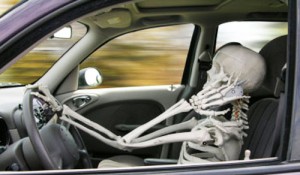As evidence mounts that using cell phones while driving is a dangerous combination, more cities across the United States are taking steps to curtail cell phone use through new laws and restrictions. San Antonio, Texas, is one of the latest cities to make the move, with a new ordinance that will take effect on January 1st, 2015 and make using a cell phone illegal while operating a vehicle.
The move is far from unprecedented in the state of Texas. State legislation has already banned certain cell phone activities throughout the state, targeting those most at risk to cause accidents during cell phone use, such as those under 18, drivers of specific vehicles, and people driving near school zones. Other cities have also implemented laws of their own: Austin has notably passed some of the strictest laws in the country, banning mobile devices of all kinds while driving or riding bicycles.
The San Antonio law offers a balance between statewide legislation and Austin's stringent laws. It bans using cell phones for talking, texting, or other activities. Like many cell phone laws, there are also legal alternatives. Drivers can use a Bluetooth device to take calls if necessary, but handling the phone is likely to land drivers into trouble. The city will most likely use January as a warning period to educate drivers concerning the new law. Afterward, the city will start handing out citations and fines. Using a cell phone could lead to fines up to $200.
Texas also offers options for Tex Defensive Driving classes to train new drivers and help those with citations remove negative marks from their records. This will be helpful for drivers caught unaware by the new regulations starting in 2015.
While Austin and San Antonio are two major cities that have already passed major cell phone laws, Houston still lags behind regarding cell phone regulation. The largest city in the state previously tried to garner support for a ban on texting, but the citizens of Houston did not support the legislation and the bill ultimately collapsed.
There are also concerns regarding how these new laws will affect the police departments of the cities that have passed them. The president of the Houston Police Officers' Union reported worries about how these laws would restrict in-car activities for police officers, who often use a variety of mobile devices, including radios, on-board computers, and other necessary accessories. There were also concerns regarding court cases about cell phone use: Getting a cell phone company to release data records that would prove the case could be a costly, lengthy process, and even then would not cover all phone-related activities.
Nevertheless, the research continues to support some sort of control over cell phone use. Recent reports have shown that, in some areas of the United States, teen deaths from texting and driving now outnumber auto accident deaths caused by drinking. Other studies have shown that using cell phones while driving drastically increases the chance of an accident for adults as well. Teens are particularly at risk because they are more likely to use their phones when driving.
Several Texas Defensive Driving options can help you remove citations and other problems if you act now. The State of Texas Education Agency has approved several traffic schools and defensive driving courses that you can take. These courses allow you to avoid detriments to your driving record, let you successfully plea for a dismissed citation, help you pay less for auto insurance, and other benefits. You can also learn additional driving skills, understand California traffic laws, and more with these courses. If the county traffic court allows you to take these classes, remember to find a list of those approved by the Texas Education Agency (TEA).




 Live Chat
Live Chat



